theartsdesk in Cologne: Mahler in the Philharmonie | reviews, news & interviews
theartsdesk in Cologne: Mahler in the Philharmonie
theartsdesk in Cologne: Mahler in the Philharmonie
Markus Stenz and the city's Gürzenich-Orchestra in Mahlerian happy birthday to their concert hall
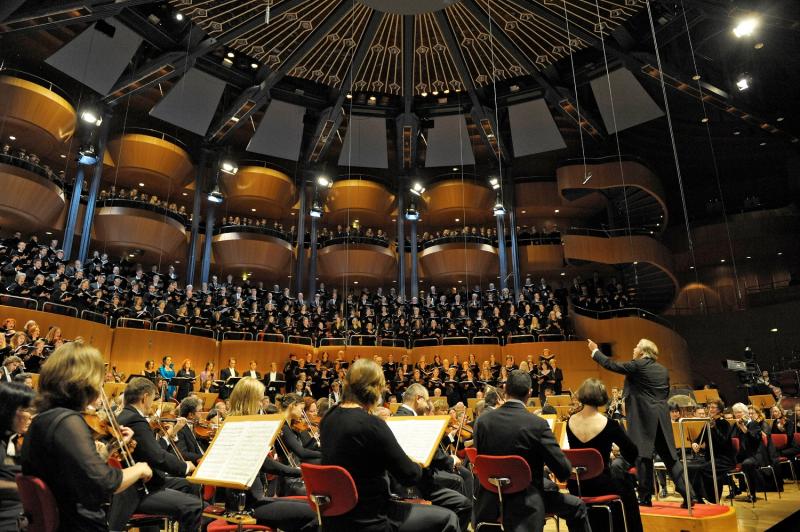
Does any city in the world, apart from Edinburgh or Venice, offer a better point of arrival by train than Cologne? There, above the steel and glass of the Hauptbahnhof, tower the twin spires of one of northern Europe’s noblest cathedrals.
I’m glad the 500-or-so-year-old Gürzenich-Orchestra of Cologne and its chief conductor Markus Stenz chose the 25-year-old Philharmonie rather than the cathedral in which to perform Mahler’s most colossal – and sometimes most subtle – symphony, the Eighth: not just because a St Paul’s performance by the LSO under Gergiev recently found ecclesiastical reverberation wreaking havoc on its cloudbursts and thunderbolts, but also because the hall’s acoustics and the great sense of amphitheatrical space, developing the Berlin ideal, were pioneering long before its great counterparts in Birmingham, Budapest and Lucerne were even thought of. 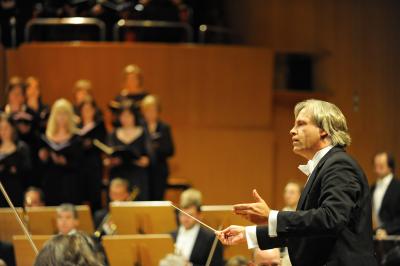 What better way to celebrate than with Mahler’s conjoined hymns to the creator spirit and to Goethe’s eternal feminine which leads us, as well as Faust, aloft? It was a given that Stenz’s interpretation (the conductor in the open rehearsal pictured right) would be muscly, well balanced and sure of where it was going. His Mahler cycle with the orchestra began in 2008 with the Fifth Symphony, a very good place to start since the Gürzenich-Orchestra gave the world premiere in 1904, conducted by the composer. I had some doubts about Stenz’s lean, forthright approach there, but none about the team’s disc of songs with Christiane Oelze – a sweet, radiant Gretchen in the Eighth last night – and Michael Volle, nor about the newly released Second, one of the most vivid on disc (roots in a live performance always help).
What better way to celebrate than with Mahler’s conjoined hymns to the creator spirit and to Goethe’s eternal feminine which leads us, as well as Faust, aloft? It was a given that Stenz’s interpretation (the conductor in the open rehearsal pictured right) would be muscly, well balanced and sure of where it was going. His Mahler cycle with the orchestra began in 2008 with the Fifth Symphony, a very good place to start since the Gürzenich-Orchestra gave the world premiere in 1904, conducted by the composer. I had some doubts about Stenz’s lean, forthright approach there, but none about the team’s disc of songs with Christiane Oelze – a sweet, radiant Gretchen in the Eighth last night – and Michael Volle, nor about the newly released Second, one of the most vivid on disc (roots in a live performance always help).
This Eighth certainly contained whole swathes that you’d want to hear again and again. Which you could, immediately after the concert, thanks to the fact that the Gürzenich-Orchestra is one of the few in the world to have embraced the once much-touted takeaway CD policy with its GO live! series. Minutes after the lengthy standing ovation had ended, a team of young orchestral helpers stood loading discs into multiple machines behind a desk in the foyer (pictured below) and taking the statutory ten euros from any punters who wanted an instant souvenir.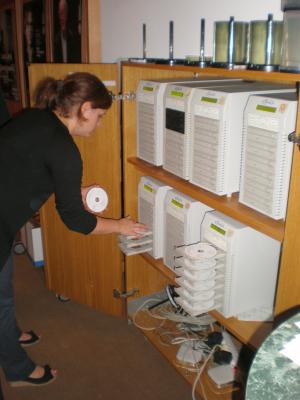 I could understand why they might. In any great Mahler performance, there’s a point which takes your breath away, flipping your stomach over with its unanticipated power. There were the obvious high spots of the first-movement “Veni, creator spiritus", impetuous from the first but only really letting rip in the terraces of heaven unleashed by fugal choirs and rampant brass at the very heart of the hymn. There were frissons in the luminous-toned introduction to Part Two, evoking Goethe’s craggy landscapes, and in the upsurge of bass Günther Groissböck’s mighty solo. Temporarily, I felt a bit let down by the tricky moment where the Mater Gloriosa flies in with pointedly sentimental, dewy-eyed violins on wings of arpeggiating harps; that needs much more beauty of tone than the Cologne strings, however keenly articulated, could give.
I could understand why they might. In any great Mahler performance, there’s a point which takes your breath away, flipping your stomach over with its unanticipated power. There were the obvious high spots of the first-movement “Veni, creator spiritus", impetuous from the first but only really letting rip in the terraces of heaven unleashed by fugal choirs and rampant brass at the very heart of the hymn. There were frissons in the luminous-toned introduction to Part Two, evoking Goethe’s craggy landscapes, and in the upsurge of bass Günther Groissböck’s mighty solo. Temporarily, I felt a bit let down by the tricky moment where the Mater Gloriosa flies in with pointedly sentimental, dewy-eyed violins on wings of arpeggiating harps; that needs much more beauty of tone than the Cologne strings, however keenly articulated, could give.
That all faded from the memory come the second descent from heaven, all tinkling celesta, piano and piccolo, paving the way for the hushed moment which, if delivered well, can be as moving as the ‘resurrection’ chorale in the much better loved Second Symphony: the "Alles Vergängliche" (how to translate Goethe's great lines? They sound so woolly and prosaic in English: "everything transitory is but a likeness"). Yes, it got me, I won’t embarrass you by describing how much. And we just flew in out-of-body experience from there to the great final climax, by way of the two incredible overlapping solo soprano phrases finely executed by Barbara Haveman and the even more Verdian-Wagnerian Orla Boylan and capped by shattering tam-tam strokes, cymbal crashes and brass choirs all around the capacious hall.
Mahler said that the motherly smile of Cologne's St Ursula was behind the most beautifully wrought of all his slow movements, the one in the Fourth Symphony The six choirs from Cologne and nearby Bonn all earned their angel wings, too. Stenz apparently – and I’ll be able to ask him this when I see him in a couple of hours’ time – resisted drafting in the professional chorus from the Cologne Opera where his orchestra also plays, arguing that Mahler’s choral settings suggest a true communal sharing. And there was a real civic pride here. Many of the choristers sang in the first, Philharmonie-inaugurating performance under Marek Janowski 25 years ago. The cathedral girls in the folksy angel ensembles of Part Two were even better than the younger children, ranged in what looked like tubs suspended from on high.
The soloists were a first-class bunch, infinitely better than the mostly inadequate line-up marshalled by the BBC Symphony Orchestra for Jiři Bĕlohlávek's 2010 First Night of the Proms, the last time I heard the work. Baritone Hanno Müller-Brachmann performed then, too; no comparison with his fine performance last night. And nightmarish memories of barking heldentenor Stefan Vinke in 2010 were banished by the sympathetic, text-conscious Brandon Jovanovich. Not bad to put all that meaning across from a position at the back of the orchestra. 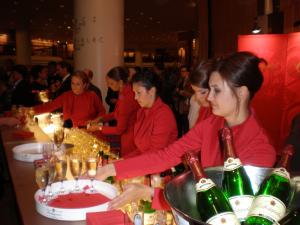 Though it may not have been in the cathedral, and though the aftermath was distinctly secular, with the entire audience, choirs and soloists mingling to quaff free champagne courtesy of Rotkäppchen (hence the get-up pictured right) in the foyers, Mahler’s music was, as he wanted, not quite of this world. Quite apart from its direct connections with the composer, overwhelmingly Catholic Cologne felt like the right place to hear the welkin ring. Few of its churches weren’t bombed to bits in the Second World War - much of the cathedral survived – but their calm interiors house endless medieval statues of the Virgin and the saints.
Though it may not have been in the cathedral, and though the aftermath was distinctly secular, with the entire audience, choirs and soloists mingling to quaff free champagne courtesy of Rotkäppchen (hence the get-up pictured right) in the foyers, Mahler’s music was, as he wanted, not quite of this world. Quite apart from its direct connections with the composer, overwhelmingly Catholic Cologne felt like the right place to hear the welkin ring. Few of its churches weren’t bombed to bits in the Second World War - much of the cathedral survived – but their calm interiors house endless medieval statues of the Virgin and the saints.
One has the strongest connection with Mahler: Saint Ursula, whose motherly smile the composer said was behind the most beautifully wrought of all his slow movements, the one in the Fourth Symphony, and whose 11,000 virgins slaughtered along with her by the Hun in Cologne – don’t ask – dance in the childlike heaven of the song-finale. Their bones are all supposed to have been found on the site of the present church dedicated to the saint (pictured below). Its golden chamber, described as a tumble of sacred limbs and reliquaries, was closed for restoration until late October, but I did get a glimpse of the gold on the high altar and some of the statues within. And in nearby St Andreas is the 15th-century so-called reservoir of St Ursula, its inscription telling us that her blood flowed over its sides.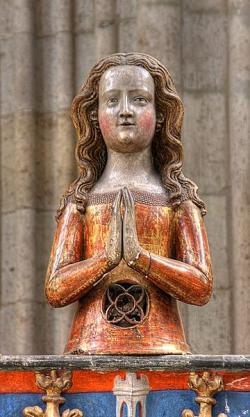 Though Mahler sees only the smile of St Ursula, and though his conversion from Judaism to Catholicism seems to have been a token gesture to ensure directorship of the Opera in Vienna, he understood well this queasy mix of sublimity and violence. Cologne seems for the most part these days a typically ordered German city, its large Turkish community fairly well integrated close to the very centre, and like Hamburg a good deal more outward-looking and genial than some of its neighbours.
Though Mahler sees only the smile of St Ursula, and though his conversion from Judaism to Catholicism seems to have been a token gesture to ensure directorship of the Opera in Vienna, he understood well this queasy mix of sublimity and violence. Cologne seems for the most part these days a typically ordered German city, its large Turkish community fairly well integrated close to the very centre, and like Hamburg a good deal more outward-looking and genial than some of its neighbours.
I cursed my fate that a mountain of work prevented me from getting here earlier to see Prokofiev’s War and Peace at the Opera the night before the Mahler Eight, and I wanted to hear so much more of what the Gürzenich-Orchestra has to offer this season. But no matter; I can catch every note of every concert on those CDs as they roll off the press, as it were. And right now, with the bells of the cathedral pealing in through the hotel window, I’m going right back to last night's recording - there'll be a completely new one available for the audience after the second performance tonight - to hear if Mahler’s apotheosis sounds as good on disc as it did in the hall.
Explore topics
Share this article
The future of Arts Journalism
You can stop theartsdesk.com closing!
We urgently need financing to survive. Our fundraising drive has thus far raised £49,000 but we need to reach £100,000 or we will be forced to close. Please contribute here: https://gofund.me/c3f6033d
And if you can forward this information to anyone who might assist, we’d be grateful.

Subscribe to theartsdesk.com
Thank you for continuing to read our work on theartsdesk.com. For unlimited access to every article in its entirety, including our archive of more than 15,000 pieces, we're asking for £5 per month or £40 per year. We feel it's a very good deal, and hope you do too.
To take a subscription now simply click here.
And if you're looking for that extra gift for a friend or family member, why not treat them to a theartsdesk.com gift subscription?
more Classical music
 Echo Vocal Ensemble, Latto, Union Chapel review - eclectic choral programme garlanded with dance
Beautiful singing at the heart of an imaginative and stylistically varied concert
Echo Vocal Ensemble, Latto, Union Chapel review - eclectic choral programme garlanded with dance
Beautiful singing at the heart of an imaginative and stylistically varied concert
 Scott, Irish Baroque Orchestra, Whelan, RIAM, Dublin review - towards a Mozart masterpiece
Characteristic joy and enlightenment from this team, but a valveless horn brings problems
Scott, Irish Baroque Orchestra, Whelan, RIAM, Dublin review - towards a Mozart masterpiece
Characteristic joy and enlightenment from this team, but a valveless horn brings problems
 Classical CDs: Voice flutes, flugelhorns and froth
Baroque sonatas, English orchestral music and an emotionally-charged vocal recital
Classical CDs: Voice flutes, flugelhorns and froth
Baroque sonatas, English orchestral music and an emotionally-charged vocal recital
 Kanneh-Mason, Britten Sinfonia, Shave, Milton Court - a grin and a big beaming smile
A pair of striking contemporary pieces alongside two old favourites
Kanneh-Mason, Britten Sinfonia, Shave, Milton Court - a grin and a big beaming smile
A pair of striking contemporary pieces alongside two old favourites
 theartsdesk at the New Ross Piano Festival - Finghin Collins’ musical rainbow
From revelatory Bach played with astounding maturity by a 22 year old to four-hand jazz
theartsdesk at the New Ross Piano Festival - Finghin Collins’ musical rainbow
From revelatory Bach played with astounding maturity by a 22 year old to four-hand jazz
 First Person: Manchester Camerata's Head of Artistic Planning Clara Marshall Cawley on questioning the status quo
Five days of free events with all sorts of audiences around Manchester starts tomorrow
First Person: Manchester Camerata's Head of Artistic Planning Clara Marshall Cawley on questioning the status quo
Five days of free events with all sorts of audiences around Manchester starts tomorrow
 Goldscheider, Brother Tree Sound, Kings Place review - music of hope from a young composer
Unusual combination of horn, strings and electronics makes for some intriguing listening
Goldscheider, Brother Tree Sound, Kings Place review - music of hope from a young composer
Unusual combination of horn, strings and electronics makes for some intriguing listening
 theartsdesk Q&A: composer Donghoon Shin on his new concerto for pianist Seong-Jin Cho
Classical music makes its debut at London's K-Music Festival
theartsdesk Q&A: composer Donghoon Shin on his new concerto for pianist Seong-Jin Cho
Classical music makes its debut at London's K-Music Festival
 Helleur-Simcock, Hallé, Wong, Bridgewater Hall, Manchester review - moving lyricism in Elgar’s concerto
Season opener brings lyrical beauty, crisp confidence and a proper Romantic wallow
Helleur-Simcock, Hallé, Wong, Bridgewater Hall, Manchester review - moving lyricism in Elgar’s concerto
Season opener brings lyrical beauty, crisp confidence and a proper Romantic wallow
 Kohout, Spence, Braun, Manchester Camerata, Huth, RNCM, Manchester review - joy, insight, imagination and unanimity
Celebration of the past with stars of the future at the Royal Northern College
Kohout, Spence, Braun, Manchester Camerata, Huth, RNCM, Manchester review - joy, insight, imagination and unanimity
Celebration of the past with stars of the future at the Royal Northern College

Add comment